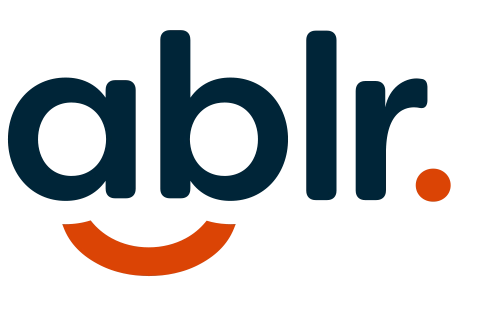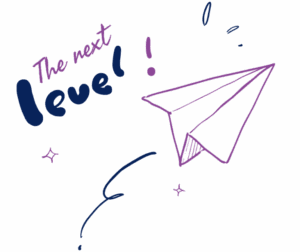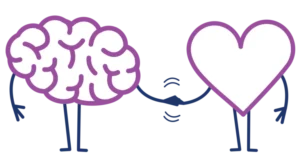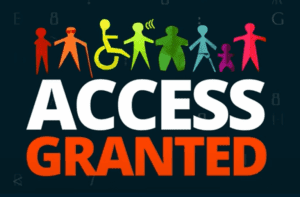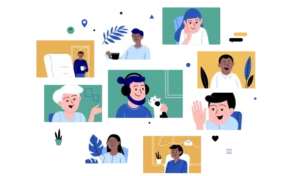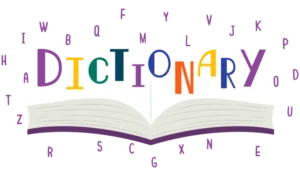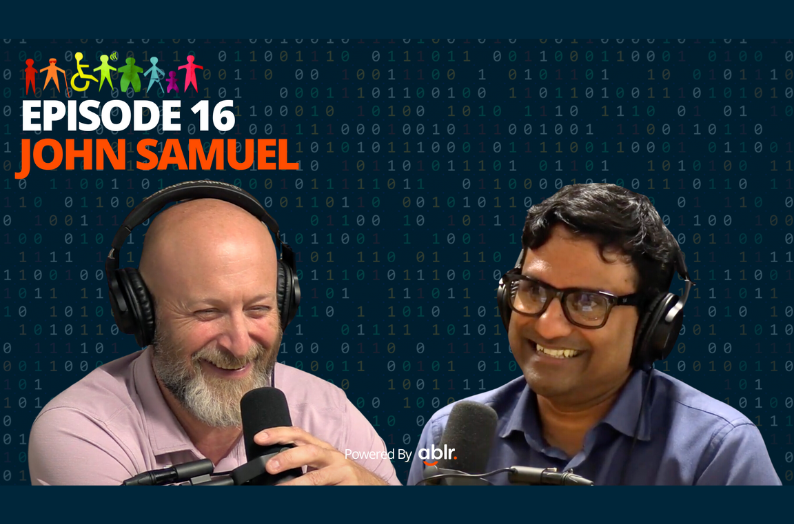Access Granted: John Samuel Part 3 Transcript. Tune in wherever you listen to podcasts.
Mike: Welcome to Access Granted, the podcast powered by Ablr. I’m your host, Mike Iannelli, and today we have one of my favorite people in the world, who also happens to be my co-founder, back for a meaningful conversation. In this episode, we’ll hear all about John Samuel’s TED Talk experience, we’ll discuss learnings over the years of building a disability inclusion focused business, and learn more about the hearts behind our mission. Let’s jump right in.
You did a Ted talk, which to me, that’s the pinnacle of a presentation. Talk about that experience because being on stage, with that badge behind you and telling your story. What was that like? What was that moment like?
John: It’s kind of surreal. Cause I never thought about doing a Ted talk and it was Sharon Delaney McLeod. Our dear friend Sharon who was one that said you have a TED talk in you. And you know, she’s like we’re gonna apply, we need to apply, let’s just apply. And we applied to a couple, and I didn’t get any responses. And then I was like I don’t really have an idea worth sharing. Because I didn’t have any, It wasn’t something like a goal.
I wasn’t like I need to do this. I didn’t really, I just kind of let go. And Sharon was not going to let it go. And so one day Sharon was at a networking event and the organizers of TEDxRaleigh were at this event. And Sharon’s talking to them and saying, “Oh you missed out on the best story ever.”
And they’re like, who, what? And then they’re like, “Oh we’ll put him in the next TEDx.” So that’s how I got in. So my TEDx experience was a little bit different. But when I got there, Sharon really kind of coached me. She helped me figure out my story and understand the why.
And so we talked about the idea of belonging. So inclusion, diversity, equity, and accessibility. And because this was my kind of talking point, we kept on talking about DEI. And it was really accessibility and disability. Inclusion was not necessarily part of the talk track. And this was an opportunity to talk about that on the TEDx stage and to really kind of put in that focus of accessibility. Why we need to be thinking about accessibility in the context of DEI.
And so it was a really amazing experience. But I didn’t realize the impact that my TED talk would make, until I met this young lady, Aditi Rao. A 6th grader in Raleigh, and she has a visual impairment. And she saw my TED talk and was inspired by it. And just a couple weeks ago, she did her own TEDxYouth talk, and she crushed it. Crushed it, crushed it, crushed it.
I did these speeches, brought me to tears. I’m sitting there. And that’s when I realized that, oh when I talk maybe someone else was impacted by it. And she was impacted by it. Now i’m getting it and it’s like this full circle moment. I didn’t understand the magnitude of it, now I do and it’s pretty special.
Mike: I didn’t know that man. We need to talk more. I didn’t know that, and you need to send that to me because I’d love to see it.
John: I just posted on LinkedIn today.
Mike: Oh, you did? Okay.
John: Yeah, dude.
Mike: I’ll check it out.
John: Yeah.
Mike: John, as we sort of kind of begin to wrap up a little bit, you and I have come through a lot together. And we have not done this alone by any stretch of the imagination.
There’s a lot of amazing people out there at the Walk West squad at the LCI squad. Jeffrey in our past, who was a big believer in what we were doing. Don and Patrick and the whole crew of believers in the mission. Now, every part of this has been earned every step of the way.
And you’re a smart guy. And I think there’s a lot of people out there that can benefit from your words. And so, as you look back on the past and when you remember some of those very specific moments that you have. Whether it’s at a restaurant, or in a car, or on the phone, but we’ve had probably four or five of these over the five years.
But what are some of the things that you could pass along, some of the things that you’ve learned. Because you’ve been through a lot man. And we all have. And I agree there’s no joy without suffering. And I think that’s a hard lesson to learn. It’s a painful lesson to learn, but it’s a lesson worth learning.
What are some of the things, just some points or some thoughts, some of your wisdom in terms of what you’ve been through. Because it’s an important thing. And I think some of your knowledge can help some others along the way.
John: Yeah, no there’s a lot of lessons learned. Whether it be from a business perspective, from a life perspective. You talk about the car, the talks we had in the car and restaurants, cause that was a pivotal moment in our business.
You and I had a meeting with our team or what we called our leadership team at that time. There was around five of us, five or six of us at that time. And we had gotten bigger. We grew faster than, yeah really fast. We grew fast and we brought on people with really great resumes. And we thought that this is what we needed.
And I remember in that meeting, there was a lot of tears, a lot of yelling, and it showed the chaos of our team. And at that moment, I went into that call, and it was in person actually. You and I were sitting across the table and I was talking to you. And I don’t think I was ever candid, that radical candor. You and I never had that conversation.
And as we were talking and having this difficult conversation, it struck me. Because at the end of the meeting, the team really felt like we were just broken. And you and I went in the car to go to this restaurant to meet with the team. And I remember sitting in the car and talking to you. Just you and I having this really candid conversation. And saying that, I think it’s going to be you and me man, at the end of the day.
And it kind of reminds me, cause I had this conversation with this other person who told me the people who you trust will be there by your side at the end of the day. And out of that group of six people, the three who are left are you, me, and Kim. And that’s the people who I trusted because I could have real conversations with.
John: And so one piece of advice I would say in business is put people who you can trust, you can have radical candor, and who can take that. Because underlying is a level of caring. And I think that that’s something I couldn’t have had with the other people on the team at that time. It was a radical candor.
They may have had great resumes.
Mike: Great resumes.
John: Great resumes.
Mike: Great people.
John: Great people.
Mike: But fit, right.?
John: The fit and the trust, the underlying caring and being able to have real conversations. I don’t think I had that with those individuals. It just wasn’t the right time. And I think that that’s what helped us.
So really, when you’re building a team, don’t look necessarily for resumes or the best to look on paper, but find who’s the best fit. Find the ones who fill those gaps, right? Because at the end of the day, you want to build a team, not a group of individuals. And then when you’re talking about the personal side, the lesson that I learned is to stay positive.
You know, and it’s kind of cliché, like things will get better.
Mike: All the clichés are real. They are all real.
John: And you know, you will keep going down, there will be new lows, but just staying positive in those dark times. And for me was also sharing, don’t hold stuff in because it can be very lonely.
Talk to people. Whether it be a therapist, whether it be a close confidant, share what’s going on. Talk through things. Because what you’ll realize is that others will be able to empathize with you. Because they’re going through different things. It may not be the same thing you are. They will benefit from hearing you. And if you can build that kind of communication, that trust with people, it’s really special. And it’ll help you get through those difficult times.
So at the end of the day, I think both in business and life is build trust with people, be vulnerable and communicate.
Mike: Reverend John Samuels, everyone. Yeah, there’s still a couple things I want to ask you. But yeah, that’s a good way and I appreciate that. I mean John.
John: That’s helped us.
Mike: It’s helped us radically, I mean it. But you got to be open to that. And that’s the hard thing is you. And I think a lot of people, it’s a tough thing to recognize that you’re broken or you’re not who you thought your ego was telling you were going to be. And I remember you saying, would you report to me?
I remember you saying that. Would you report to me? Would you? And at the time we were sort of like these equal partners. And we’re partners. But the point was, and I remember that was in that meeting actually. And I was like, people were looking at me like where is this coming from?
No, I’m not, we’re partners. And I’m like, and I remember that feeling. And I got to tell you, that was a humbling moment for me. Because the whole time I’m thinking, it is so funny when your ego gets in the way. It really just destroys things.
But when you can recognize that you’re just a human being, and you screw up, and you mess up, and you hurt people, and you don’t mean to, but you do. And you hurt yourself and you’re just insecure and scared really. But my point in this is that the best decision that I ever made
was to recognize that my piece of the puzzle was not to be the CEO. My piece of the puzzle was to follow. And bro, I’ve been following you man from whenever that moment really clicked. But I’ll tell you as someone who has come from an ego land. Kind of sounds like Lego Land, but Ego Land. To watch what you’ve done man, to see the vision, to see the leadership.
We all make mistakes. We’re all human. But dude, it has been an incredible honor to watch man. Everything that you have said and we’ve discussed has all come to fruition. And so it leads me to my last question kind of. And I still want to talk about your shades, we might do that too. But the last question that I have for you really is about what do you see. And you and I are both learning about meditation, you’ve taught me a lot about that and spirituality and faith and all these things that people who listen to this are probably like, what does this have to do with, but it has everything to do with Ablr.
It has everything to do with our team. It has everything to do with life. But when you look out on the horizon what do you feel with Ablr, with John Samuel, with everything that we’re doing with disability inclusion, with etiquette, with accessibility, with DEI. Like what do you feel in your bones?
John: You know I appreciate everything you’ve been saying. Again, we’ve been doing this together. Our team has been doing this. And I think that as we start to look at the future of the business, you and I talked about this in the early days of having different Ablr. Like Ablr Works, Ablr Plus.
Mike: Yeah, sure.
John: There’s all these, 360 right? There’s all these.
Mike: I love naming these things. It’s so fun.
John: You know, when we start to think about the holistic experience of somebody with a disability, right? Whether it be from a corporate perspective of like talking about marketing, right? Because I mean, we’re working with an amazing firm here at BURT to do this podcast.
They’ve been supporting us with our social, they’ve been doing a great job. And it goes back to this whole idea of proximity builds empathy, right? The more time we learned about them from their work with 321 Coffee, right? They were working with a mission driven organization. We saw the work that they were doing with them and said, this is an organization that aligns with us.
And so when we think about the future of our business, we think about how can we align with other businesses that are mission driven, mission alignment with us. So I think there’s a lot of different ways we can go, whether it be marketing, whether it be finance, investment. Because giving you that financial independence, how can we build wealth
for people?
Mike: Mm-Hmm.
John: Or than investing in organizations who are investing in entrepreneurs with disabilities, you know? And then we also talk about fitness, mental health. These are things that we talk about internally on our team. I wish we could record the conversations we have on our Friday mullet meetings right? For those of you who don’t know, our Friday Mullet meetings are business up front and party in the back.
Mike: And we party.
John: We party. We got DJ Angus Kola playing some tunes and us dancing. But the conversation got.
Mike: We got Kim. Actually John, I got a picture of Kim dancing.
John: Hands up?
Mike: Hands up and it was going to be the picture that we put on Casey’s Corner, which is in the newsletter now. New section for Casey’s Corner. But for those of you that don’t know, Kim almost refuses for the most part to ever go on camera. And for, I think for the first two years, I never even knew what she looked like until we met. But we got her on camera dancing.
The whole crew was. And sorry, go back. The mullet meetings are phenomenal.
John: But we talk a lot about things that are going on in our life. Whether it be mental health we talk about, that’s the thing about our team is so we’re open about it. We talk about fitness. We talk about health. You know, my man right here as we’re walking into the studio today, I’m grabbing onto Mike, walking into the building. I’m like, dude, I can feel your muscles bro. Like I’m seeing that, I’m seeing the fitness.
Mike: You’re an influence man.
John: No, but.
Mike: I’m coming for you bro.
John: Kim Casey influenced me, right? And that’s the thing.
Mike: She was doing yoga this morning at 5:00 a.m. Just as an FYI.
John: Right exactly and it’s those things that we all influence each other. And for the good ways, right The good things that we influence each other. And I think if we can help individuals in the disability community become healthier, financially healthier, mentally healthier and, health wise healthier. Like fitness, those are good things. And so I think there’s a lot of directions we can take Ablr. But we’re not gonna be able to do it by ourselves.
It’s going to come with partnerships. It’s going to come with finding great partners who can help us expand and offer new offerings. Because what we’re doing is creating a more inclusive environment and removing barriers for people with disabilities. Remember our mission is remove barriers for people with disabilities in all aspects of life.
And when you have that type of mission, there’s so many ways we can take this. So I think the future is bright for us and it’s a green field out there for us. And I’m glad to be on that journey with you brother.
Mike: Man, you have no idea how grateful I am. I really am.
Yeah we’re heading down to the greener pastures my friend. And I see so many wonderful things for our community, our mission, our advocate, our team. I just think, God what’s it going to look like? What’s our team going to look like? And I’m excited. And before we wrap, I just want to do a shout out to Nicole and Eli and Ethan.
I don’t know if they’re going to hear this, but Eli and Ethan are the coolest little dudes on the planet. I’ve got a couple other cool dudes on the planet too, but these guys are the coolest. And I thank you for allowing me to spend so much time with them. It’s been a huge influence on my life being around you guys.
And I also want to shout out just quick to my kids too, Poppy, Drew and Pelton. This is sort of our first time, well second time together talking about the business. But in hopes that this will be public, and how grateful we are for our family and our friends and the people that have been our parents, the people that have believed in us. Because it was a long time that people didn’t.
And I still remember the day John, just making phone calls four years ago. And it was like, and what? And now it’s, oh so and so referred us for Manscaped. It’s like, oh my God. Like, really?
John: Yeah.
Mike: So I want to say thank you for every partner, every client, every advocate, every human being that is believing in a mission that’s greater than themselves and to join on with us.
And John, thank you for being here man. I’m just so grateful that you came on man. I hope people hear the stories of what we’re doing and what you’re doing and what our team is doing and really just jump on board. Because when you change your perspective and when you experience things that you may not have ever experienced before, especially the kindness, and the heart, and caring for other people than yourself. It opens up a dimension into an, I swear I tell people it’s opens a window up to another world that you’ve never even known existed.
And I think I’m becoming proof of that. I think Ablr is becoming proof of that. And I love you my brother. I’m so grateful to be on this journey with you and thank you all for being part of this Access Granted podcast today. Johnny Sam’s has an amazing book, Don’t Ask the Blind Guy for Directions.
It’s an incredible book and I think it’ll change your life. But John, I love you brother. Thanks for being here, man.
John: Thank you. And hit subscribe on this, this podcast cause it is amazing and I love it, bro. And congratulations on the success of this podcast.
Mike: I appreciate it man. Thank you man.
Thank you so much for tuning in to Access Granted. After three heartfelt conversations with my co founder, I just want to say that hosting this podcast is an incredible honor, and I’m truly, deeply grateful for the chance to share such meaningful conversations with inspiring guests who are dedicated to making the world a more inclusive place for everyone.
I’m continually thankful for the unwavering support of our partners, our amazing team, and especially John Samuel. Whose leadership, love, and brilliance guide us all until next time. Keep fighting the good fight.
